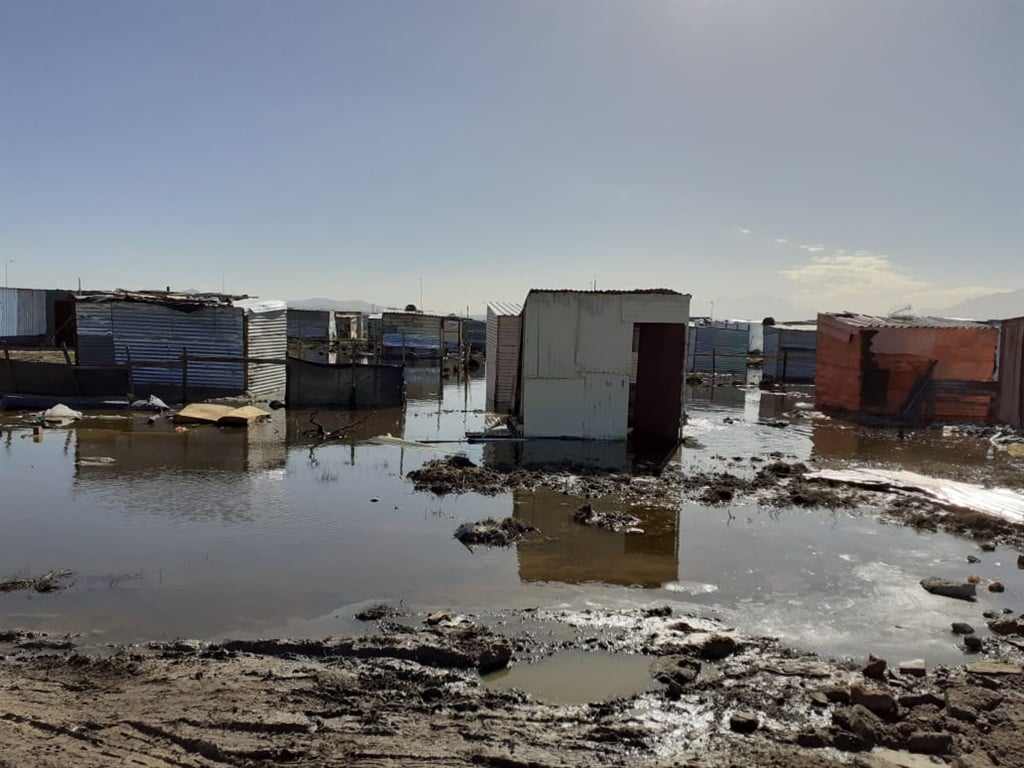
- The City of Cape Town says it legally cannot help informal settlements prevent flooding on illegally occupied flood plains.
- It has issued a list of DIY handy hints on using old clothes to make sandbags instead.
- More than 70% of the recent occupations it considers unlawful are in water paths.
The City of Cape Town provided some handy DIY tips for residents of informal settlements faced with the threat of flooding on allegedly illegally occupied flood plains.
It said it cannot legally help those who occupied land without permission, so it encouraged residents to take measures to protect themselves.
"The extreme increase in mostly large-scale, organised unlawful land occupations, often with the involvement of so-called 'shack-farming' syndicates since the start of the Covid-19 lockdown period in March 2020, and while the national crisis regulations remain in effect, have led to the establishment of new settlements on flood-prone land in many parts of the metro such as in Dunoon, Khayelitsha, Kraaifontein and Mfuleni," Human Settlement MMC Malusi Booi said in a statement on Friday.
"More than 70% of all recent occupations have happened on land that is not suitable for human settlements. The City expects there to be increased flooding incidents here this winter."
READ | Western Cape saw more than 1 000 land invasions in past 10 months
Earlier this year it said it had spent more than R355.8m for the 2020/21 financial year to prevent illegal land invasions and the occupation of completed units.
"In response to request for milling or dry sand to raise floor levels of shacks to prevent flooding in water-logged areas, Booi said the City could not oblige.
"The City is however unable to provide this material in most of the new settlements created in wet areas as it won't help to reduce the flooding and may even increase the risk of flooding, as water channeling could be changed," he explained.
"This would simply displace water to the dwellings of other residents. Unfortunately, we can only help on land that was planned for housing purposes and not prone to flooding, and in areas that aren’t situated on land meant to catch water, such as dams and ponds."
"The City may also legally not provide this assistance in some instances."
Booi said the City is looking at options on how to help, but in the meantime recommends filling old long sleeved shirts, old trousers or refuse bags with sand for DIY sand bags.
In the meantime, various departments will help residents construct canals to lead flood water away from affected areas, and will monitor these high risk areas daily to determine flood risks.
Booi added:
He said the City does what it can to deliver housing opportunities, upgrade informal settlements and prepare for flooding and other natural disasters, and partnerships are key.
"Work continues but we ask our residents to help and to implement some no and low cost tips to reduce the risk of flooding. Raising the floor level of structures, making a DIY sandbag and digging furrows around dwellings are simple ideas which residents can implement," Booi said.
Last year the City said it did not have the money for new services on unplanned settlements, and it does not receive support beyond its own funding capabilities, and national budget cuts.
Many occupations on land were never intended for people to live on either.
It said it was actually surpassing its service commitments to settlements where it was possible to help.
Other tips to mitigate flooding include:
- Clearing out drainage systems;
- Raising the floor level of a structure so that it is higher than the natural ground level;
- Making sandbags;
- Digging trenches around the house to divert water away from the house
- Reporting blocked drains, intakes and illegal dumping – illegal dumping in the stormwater canals and sewers make flooding worse;
- And waterproofing roofs, clear gutters and remove dead tree branches.
Do you want to know more about this topic? Sign up for one of News24's 33 newsletters to receive the information you want in your inbox. Special newsletters are available to subscribers.




 Publications
Publications
 Partners
Partners























